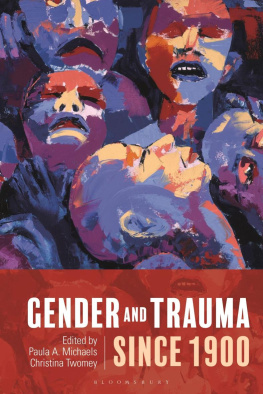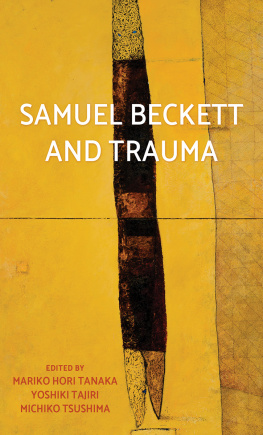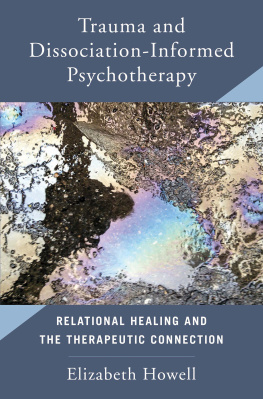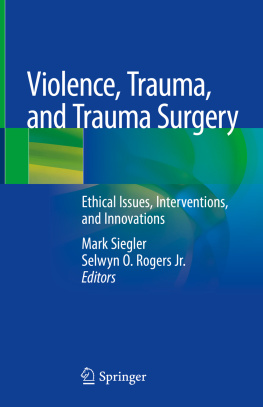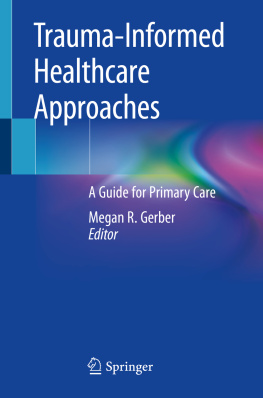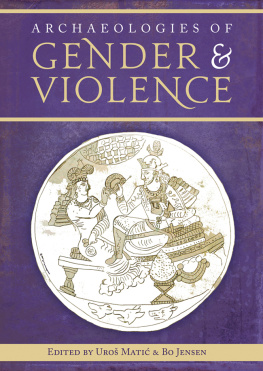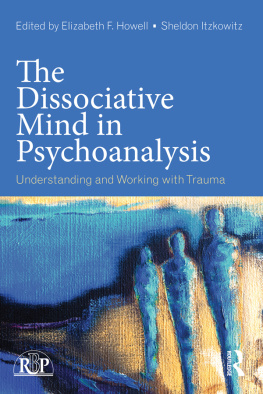Gender and Trauma since 1900
Gender and Trauma since 1900
Edited by
Paula A. Michaels and Christina Twomey
For my mentors John Starkes Bushnell and Donald J. Raleigh
PAULA A. MICHAELS
For Patricia Grimshaw, who taught me about gender and history
CHRISTINA TWOMEY
Contents
Figures
Andr Brouillet, Une leon clinique la Salptrire, [A Clinical Lesson at the Salptrire], 1887 |
Mural (1969) memorializing Italian casualties from the Battle of Caporetto. |
Table
Number of Executions per Offence Perpetrated |
Jennifer Craig-Norton is a visiting fellow at the Parkes Institute for the Study of Jewish/Non-Jewish Relations at the University of Southampton. Her publications include Migrant Histories and Historiographies: Essays in Honour of Colin Holmes (2018), co-edited with Christhard Hoffman and Tony Kushner and The Kindertransport: Contesting Memory (2019). She is currently writing a book on Jewish refugee domestics.
Joy Damousi is Professor of History and Director of the Institute for Humanities and Social Sciences at the Australian Catholic University. She is President of the Australian Academy of the Humanities and a fellow of the Australian Academy of the Social Sciences. She has published widely on aspects of gender and womens history, memory and aftermaths of war, history of emotions, sound and war, and the history of migration and refugees. Her most recent book is Memory and Migration in the Shadow of War: Australias Greek Immigrants after World War II and the Greek Civil War (2015).
Lisa Featherstone is an Australian historian, based at the University of Queensland. Her work focuses on sexuality, medicine and the law. She currently writes on sexual violence, including child sexual abuse and rape in marriage. She is the author of two monographs, Lets Talk About Sex: Histories of Sexuality in Australia and Sex Crimes in the 1950s (with Andy Kaldelfos). The latter was shortlisted for the NSW Premiers Prize in 2017. She has published extensively, including articles in Gender & History, Womens History Review, Feminist Legal Studies, Australian Historical Studies and the Journal of the History of Sexuality .
Katie Holmes is Professor of History and Director of La Trobe Universitys Centre for the study of the Inland. The interplay between an individual, his or her culture and environment has been central to her work and she has explored this in the context of environmental history, oral history, gender, womens diaries, gardens and mental illness. Her most recent work includes the co-authored Mallee Country: Land, People, History (2020); Does it matter if she cried? Recording emotion in the Australian Generations oral history project, Oral History Review , 44:1, 2017; and Talking about Mental Illness: Life Histories and Mental Health in Modern Australia, Australian Historical Studies , 47: 1, 2016.
Hannah Loney is a Gilbert Postdoctoral Early Career Fellow in the School of Historical and Philosophical Studies at the University of Melbourne, Australia. Her research interests include womens history, twentieth-century Southeast Asian and Pacific history, transnational activism, histories of violence, oral history and international human rights. Hannahs book In Womens Words: Violence and Everyday Life During the Indonesian Occupation of East Timor, 19751999 was published in 2018
Paula A. Michaels is an Associate Professor of History at Monash University. Her work centres on modern medicine and health, with a focus on the USSR in a transnational and comparative context. She is the author of two prizewinning books: Curative Powers: Medicine and Empire in Stalins Central Asia (2003) and Lamaze: An International History (2014). Michaels also co-edited Paths to Parenthood: Emotions on the Journey through Pregnancy, Childbirth, and Early Parenting (with Renata Kokanovic and Kate Johnston-Ataata, 2018). She is currently working on a project on Soviet Cold War medical diplomacy.
Nathalie Huynh Chau Nguyen is an Associate Professor in History at Monash University. An Oxford graduate, she held four fellowships between 2005 and 2015, including two Australian Research Council Fellowships and a Visiting Fellowship at Oxford University. She is the author of four books, including 2010 Choice Outstanding Academic Title Memory Is Another Country: Women of the Vietnamese Diaspora (2009), and South Vietnamese Soldiers: Memories of the Vietnam War and After (2016). She is editor of New Perceptions of the Vietnam War (2015). Her latest grant is for an ARC Discovery Project on the refugee legacy for second-generation Vietnamese in Australia.
Rebecca Jo Plant , Associate Professor in History at the University of California, San Diego, is the author of Mom: The Transformation of Motherhood in Modern America and co-editor of Maternalism Reconsidered: Motherhood, Welfare, and Social Policies in the Twentieth Century . Along with Frances M. Clarke, she won the Letitia Woods Brown Memorial Prize and Berkshire Conference of Women Historians Prize for best article for The Crowning Insult: Federal Segregation and the Gold Star Mother and Widow Pilgrimages of the Early 1930s ( Journal of American History ). The two of them are currently completing a study on the problem of underage enlistment during the American Civil War.
Elizabeth Roberts-Pedersen is a Senior Lecturer in History at the University of Newcastle, Australia. She has published on several elements of the history of modern warfare, including international volunteering, discipline and military medicine. Her current project, funded by an Australian Research Council DECRA fellowship (201619), examines the effects of the Second World War on the theory and practice of psychiatry.
Martina Salvante is Assistant Professor of Twentieth-Century European History at the University of Nottingham, UK. Her research focuses on fascism and the interwar period with interests in gender and disability. Her latest publications include La paternit nellItalia fascista: simboli, esperienze e norme, 1922-1943 (2020) an investigation of fatherhood under the fascist regime in Italy and the two articles Introduction: Gender and Disability in the Two World Wars and The Wounded Male Body: Masculinity and Disability in Wartime and Post-WWI Italy.
Benjamin Twagira is an Assistant Professor of modern African history at Williams College, United States. His primary research interest is African social history with special emphasis on modern East Africa and twentieth-century urban Africa. Currently he is working on a book manuscript examining the social history of militarized Kampala, the capital of Uganda, between 1966 and 1986. His other research projects explore the intersections between postc-colonial military rule, gender and health and healing in urban East Africa. At Williams, he teaches survey courses on African history, as well as conducting thematic seminars in African history on health and healing, religion, the environment, urbanization and soldiering.
Christina Twomey is Professor of History at Monash University and a fellow of the Australian Academy of the Humanities and the Australian Academy of Social Sciences. She is a social and cultural historian with specific interest in humanitarianism, internment and imprisonment in wartime, photography and violence. She is the author of four books; her most recent book is The Battle Within: POWs in Postwar Australia (2018) . She has also co-edited several collections, including The Pacific War: Aftermaths, Remembrance and Culture (with Ernest Koh, 2015) and Detention Camps in Asia (with Robert Cribb and Sandra Wilson, forthcoming with Brill).

